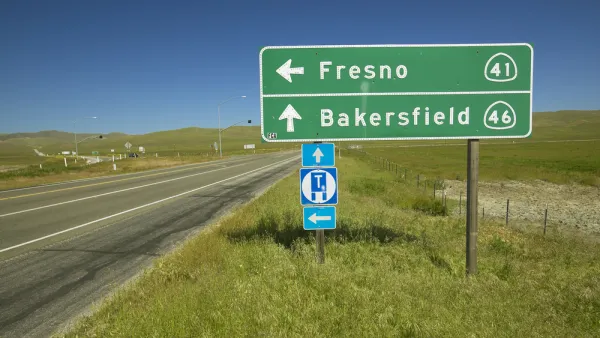Vehicle-miles-traveled fees made inroads with a potential "no-fee" pilot program in California and a new academic study in Michigan concluding that the state should adopt them. VMT fees may even get some attention in the MAP-21 Reauthorization.
Legislation to authorize a pilot program, authored by the chair of the California Senate Transportation Committee, Mark DeSaulnier, D-Concord, "gives the California Transportation Agency, the Department of Motor Vehicles and other agencies authorization to track vehicle miles traveled by motorists in a yet-to-be-determined city starting in January 2016, according to the language in the bill," writes Steve Scauzillo, about SB 1077, California's initial legislative step in what could eventually lead to a mileage-based user fee program.
If approved, the pilot would be the first in California but the third in the nation, behind similar test programs in Washington and Oregon, said Sharon Neely, transportation expert with the Southern California Association of Governments.
DeSaulnier clearly wants a "go-slow" approach in the pilot. In his FAQ webpage, he writes, "The bill does not allow the California Transportation Agency to even collect fees from volunteers participating in the study. The bill asks the California Transportation Agency to conduct what amounts to a hypothetical dry run of a mileage-based fee and report its findings to the Legislature."
In Michigan, a new report "prepared for the Michigan Environmental Council by Sustainable Mobility & Accessibility Research & Transformation (SMART) at (University of Michigan) proposes that the state move to a mileage fee funding program," writes Paul Egan of the Detroit Free Press.
“Instead of continuing to raise fuel taxes to pay for transportation infrastructure, a mileage fee could more fairly allocate costs based on the number of miles driven, the time of day, the route taken, and the weight of the vehicle,” the report says.
As we noted recently on MAP-21 reauthorization, "(v)ehicle-miles-traveled fees would almost certainly be on the list" of funding studies of revenue alternatives to the federal gas tax.
What's clear is that mileage fee advocates shouldn't expect rapid progress when it comes to transitioning away from state gas taxes, a proven, but what many say, is an unsustainable means of revenue collection due to increased fuel efficiency of vehicles, more electric vehicles on the road, declining miles traveled, and most important of all, the political unwillingness to raise fuel taxes.
FULL STORY: California could start taxing motorists for every mile they drive

Analysis: Cybertruck Fatality Rate Far Exceeds That of Ford Pinto
The Tesla Cybertruck was recalled seven times last year.

National Parks Layoffs Will Cause Communities to Lose Billions
Thousands of essential park workers were laid off this week, just before the busy spring break season.

Retro-silient?: America’s First “Eco-burb,” The Woodlands Turns 50
A master-planned community north of Houston offers lessons on green infrastructure and resilient design, but falls short of its founder’s lofty affordability and walkability goals.

Test News Post 1
This is a summary

Analysis: Cybertruck Fatality Rate Far Exceeds That of Ford Pinto
The Tesla Cybertruck was recalled seven times last year.

Test News Headline 46
Test for the image on the front page.
Urban Design for Planners 1: Software Tools
This six-course series explores essential urban design concepts using open source software and equips planners with the tools they need to participate fully in the urban design process.
Planning for Universal Design
Learn the tools for implementing Universal Design in planning regulations.
EMC Planning Group, Inc.
Planetizen
Planetizen
Mpact (formerly Rail~Volution)
Great Falls Development Authority, Inc.
HUDs Office of Policy Development and Research
NYU Wagner Graduate School of Public Service



























